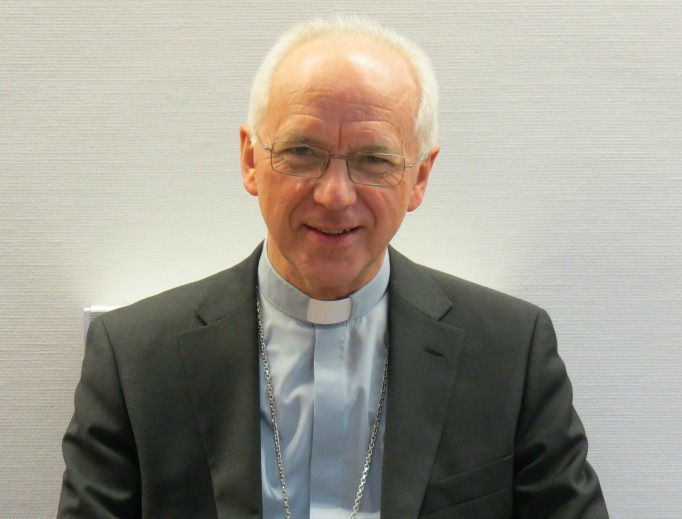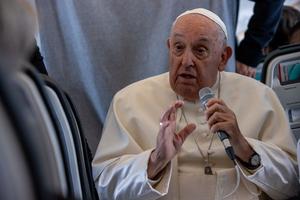Cardinal-Elect De Kesel Brings Problematic Record on Handling Clergy Abuse Allegations
The Belgian archbishop has drawn criticism for his handling as a local bishop of five separate sexual abuse files.

BRUSSELS, Belgium — Among the new cardinals to be elevated at Saturday’s consistory will be Archbishop Jozef De Kesel of Mechelen-Brussels.
Born in 1947 in Ghent, De Kesel was ordained in 1972 and served as a professor of theology and Christology, as well as formation director in Ghent and episcopal vicar for theological training and pastoral in the diocese. Pope St. John Paul II elevated him to the Belgian episcopate in 2002, appointing him auxiliary bishop in Brussels. Benedict XVI appointed him Bishop of Bruges in 2010.
But Cardinal-designate De Kesel enters the College of Cardinals with some substantial baggage, primarily in the area of handling clerical sex abuse cases during his time in Bruges.
His current spokesman in Brussels, Jeroen Moens, told the Register Nov. 8 that the archbishop did not “want to comment in detail” on five cases he has been criticized for mishandling. “He only wishes to state that all cases are handled according the policy of the Belgian bishops on the handling of sexual abuse cases and according to the suggestions and advice of experts working in commissions and contact points for sexual abuse cases,” the spokesman said.
His handling of the cases mostly took place in the context of a policy of “zero tolerance” adopted by the Belgian bishops in 2014.
The Register has obtained details on all five cases, and obtained responses from the Diocese of Bruges.
The first abuse case pertains to a Father Tom Flamez. In 2014, as bishop of Bruges, then-Bishop De Kesel appointed Father Flamez, already accused of abusing a minor, convicted and given a suspended sentence, as pastor of a parish. This appointment occurred despite an expert psychiatrist, appointed by the tribunal that tried him, writing that the priest showed an excessive arrogance, a major tendency to lie, a capacity to manipulate and to cheat, and a total lack of any sense of culpability.
Sources in Belgium have told the Register Bishop De Kesel tried to blame the Congregation for the Doctrine of the Faith for the decision, when the dicastery had left it to his own discretion.
In response, Father Koen Vanhoutte, diocesan administrator of the diocese of Bruges, told the Register Nov. 10 the complaint dates from 2008, and that Father Flamez had “complied with the conditions of a probation order imposed by the court throughout a five-year period” and that “a possible new assignment for him was subsequently sought.”
The diocesan administrator added: “He received a modest responsibility in 2014, which took into account the restrictive conditions laid down by the Congregation for the Doctrine of the Faith. He was to assist in a parish, without having any ultimate responsibility and was placed under strict supervision. As a result of reactions in the media, he did not in the end take on this assignment.”
A second case from 2014 concerns another priest in Bishop De Kesel’s Bruges diocese, Father Jeroen Claerhout, who was accused of sexual abuse in 2013. Bishop De Kesel is accused of taking no precautionary action for a year and a half, even though under the norms on graviora delicta (more grave crimes), he should have been provisionally suspended. Some claim the diocese knew about the case from as early as 2009, because Father Claerhout had to be occasionally removed from roles where children were involved, such as first Communion, and the diocese had to find another priest to fill in for him.
At his trial in 2015, the priest’s lawyer stated that both parties consented, thus there was no rape, and the court acquitted the priest, because there was too much doubt about the age of the victim at the time of the alleged crime (it wasn’t clear if he was 17 or 18). A source close to the case told the Register that Bishop De Kesel did not do anything and only acted after the affair broke in the media.
Father Vanhoutte didn’t give any timelines, but said Bishop De Kesel, presumably in 2013, “immediately passed on this complaint to the Belgian Department of Justice, who requested that the bishop not take any action which might interfere with these investigations.” However, the prosecutor did not prevent the bishop from taking any disciplinary measures.
The diocese added that Bishop De Kesel “requested on several occasions more information from the Department of Justice, but to no avail.” He nevertheless “assented to the investigation initiated by the Contact-Point for Sexual Abuse”, a kind of diocesan hotline which victims can call and have their case given an initial examination. Bishop De Kesel decided to “impose restrictive measures on Father Claerhout, in accordance with their recommendations, in relation to his pastoral activities,” Father Vanhoutte said, adding that the bishop “kept the prosecutor continually informed of the measures taken.”
In the same year, the bishop acted on another case, involving Father Marc Decuypere, but is accused of taking action only after being forced to do so. Despite the priest being accused of sexual abuse in 2010 during the period he taught at the College of Our Lady in Assebroek, a high school near Bruges, from 1984 to 1990, he was not prosecuted due to a statute of limitations. And yet notwithstanding a policy of zero tolerance, Bishop De Kesel allowed him to return to Brazil to continue his work with street children, saying the public prosecutor handling the accusation did not stop Father Decuypere from returning to the South American country. Only when the press received word of his past alleged abuse did Bishop De Kesel recall the priest to the diocese.
In Bishop De Kesel’s defense, Father Vanhoutte told the Register that as Father Decuypere denied the charges during his interrogation and received permission from the Department of Justice to return to Brazil, “the bishop decided to question him himself.”
When the priest, “on his word of honor, continued to deny the charges, the bishop saw in this context no reason to restrain him from returning to Brazil,” he explained. But the diocesan administrator stressed that Bishop De Kesel did ensure that the local bishop and the school “were informed of what had taken place.” The diocese also communicated that the local bishop and the school authorities “testified to the correct pastoral conduct of” Father Decuypere. “In their opinion there was no indication whatsoever of possible sexual abuse.”
But when in 2014 the former complaint was again raised in Belgium, Bishop De Kesel “immediately took the precautionary measure of insisting” on the priest’s return and “requested a thorough investigation by the Contact-Point,” according to Father Vanhoutte. Even though the priest “continued to deny the charges,” Bishop De Kesel decided, in compliance with recommendation from the Belgian authorities, that Father Decuypere “should not return again to Brazil.” When he did leave for Brazil, “he was subsequently suspended by Bishop De Kesel,” the diocese added, and Bishop De Kesel “informed the local bishop in Brazil of all these developments.” The priest is understood to still be in Brazil serving as a Fidei Donum missionary.
In another case, despite a series of accusations of abuse and deviant sexual behavior leveled at Father Carmino Bohez, a professor at the Major Seminary in the diocese, Bishop De Kesel qualified his behavior merely as “imprudent” and refused to accept Father Bohez’s letter of resignation as associate vicar for youth. Again, he only did so because of commotion in the press.
In the bishop’s defense, the diocese said that prior to 2014 “neither the Department of Justice nor the Contact-Point received any complaint” regarding Father Bohez. In 2014, “insinuations appeared in the press” about him and the bishop “was asked for clarification.” Bishop De Kesel “immediately assigned the Contact-Point to initiate an investigation” and as a result, Father Bohez “resigned from his position as assistant Minister for Young People. Bishop De Kesel accepted this resignation.”
Father Bohez, although he admitted the abuse, was never convicted because no formal complaints were made. However, several seminarians had launched allegations of improper conduct against the priest. One said it had made him want to commit suicide, another look a leave of absence and said he had afterward “compartmentalized” the abuse, refusing to acknowledge it.
A final case involved Father Antoon Stragier whose abuse of several children became publicly known in 2015, although he had been repeatedly discredited for years and no action from his superiors had been taken. The diocese had known of his abuse since 2004 having moved him from parish to parish. Father Stragier subsequently had been made director of diocesan pilgrimages, but in spite of the various allegations and a policy of zero tolerance, Bishop De Kesel took no action until it became public knowledge and only then asked him to step down.
Father Vanhoutte said the first complaint dated from 2004, adding that “taking into account” a 2005 “mediation agreement” by the Department of Justice, in 2006 Bishop Roger Vangheluwe, then the bishop of Bruges, appointed Father Stragier to the parish of Anzegem. Bishop Vangheluwe himself was later found guilty of sexually abusing two of his nephews.
The appointment to that parish was “overruled in light of reactions in the media,” the diocese said, resulting in Bishop Vangheluwe appointing him instead “as director of pilgrimages.”
“After his appointment in 2010, Bishop De Kesel formulated the conditions and the restrictive measures” under which Father Stragier was to “perform his responsibilities” — a measure agreed to by the Contact-Point the following year. In 2015, the diocese said Father Stragier “was immediately dismissed subsequent to disclosure of new incriminating facts.”
Other Areas of Controversy
Beyond the clerical sex abuse issue, Archbishop De Kesel has been controversial in other areas. Last year, he told a television reporter that he respects homosexuals and the way they live their sexuality. In 2010, he voiced support for women’s ordination to the priesthood, saying it is “negotiable,” but has subsequently backtracked. He has also said that priestly celibacy should be optional as for some people it may not be “humanly possible.”
He also attracted opposition from traditional Catholics by surprisingly closing down the “Fraternity of the Holy Apostles," an association of clerical faithful in the archdiocese supported by his predecessor, Archbishop André-Joseph Leonard.
A great deal of the credit for the Cardinal-designate’s rise goes to his former superior and predecessor in Brussels, Cardinal Godfried Danneels. The Belgian cardinal, who headed the archdiocese of Brussels from 1979 until 2010 and is a close confidant of Pope Francis, controversially admitted in September 2015 to being part of a “mafia” that sought to prevent Benedict XVI’s election in 2005. After retiring, it was discovered he'd covered up an abuse scandal.
“Cardinal Danneels wanted Bishop De Kesel to be his successor but his appointment was blocked by Benedict XVI who chose Archbishop Leonard instead,” said the source close to the Belgian Church. “At his installation ceremony in Brussels in 2015, usually the metropolitan archbishop would have done it, so in this case Archbishop Leonard, but for this installation it was Cardinal Danneels and Archbishop Leonard was just a concelebrant, showing the close relationship the cardinal and Archbishop De Kesel have.”
Some have described Archbishop De Kesel has a protégé of the cardinal. However Moens, the archbishop’s current Brussels spokesman, said that from 2002, when Msgr. De Kesel was appointed as an auxiliary bishop of the archdiocese serving under Cardinal Danneels, “they established an fine professional relationship” but that he “by no means” considered himself to be what some have called “a master protégé.”
Edward Pentin is the Register’s Rome correspondent.
- Keywords:
- archbishop jozef de kesel
- belgium
- cardinal godfried danneels
- clergy sexual abuse
- college of cardinals
- edward pentin
















